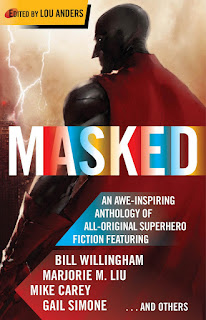
Another San Diego Comic Con has come and gone, leaving me in a state of post-con withdrawal and well-earned exhaustion. This was probably my most enjoyable comic con to date, made so entirely by the people that I spent it with.

I roomed, as has become the tradition, with good friends John Picacio and Paul Cornell, two guys I can never see enough of. My plane Wednesday was late, but I got in just in time to make my dinner with editors Ann Sowards, Diana Gill and Ann Groell, illustrator John Picacio, and (unexpected arrival) author Paolo Bacigalupi (
The Drowned Cities). io9's Charlie Jane Anders (no relation but one of my favorite people) and Annalee Newitz (also fav) dropped in at the end, making for a great night at Rocking Baja Lobster. Then it was off to the Grand Lobby Bar at the Hyatt, where I bumped into my friend Bill Willingham (
Fables, Down the Mysterly River) and had drinks until late with Picacio and Paolo.
Thursday my dear friend Stephenson Crossley took the train down from LA, just for four hours, to hang. We paled around the con, the met up with Pierce Watters (Paizo), Michael Rowley (Ebury), and James Parker (Hastings) for dinner at
JSix. Great meal with great conversation with great people. Afterwards, we walked to
Bootlegger for the Random House Party, which was the most comfortable location for a publishing party I've thus far attended in San Diego. Then back to the Grand Lobby Bar at the Hyatt, where Paul Cornell was nice enough to introduce John Picacio and I to some of the organizers from
Convergence, a convention at which Picacio and I will both sit as Guest of Honor next year.
Friday started off with a breakfast with my buddy filmmaker
Kenny Golde, then a lunch with John Picacio and Matt Gagnon, Editor-in-Chief of BOOM! Studios. Matt and I share some authors in common and our jobs are remarkable similar across our related fields, so it's always fun to catch up with him. Afterwards I met up with Joseph Mallozzi (of
Stargate fame, in town to sign his comic book,
Dark Matter) and the lovely Akemi, then had drinks with Michael Alan Nelson (
HEXED, Fall of Cthulhu). Midway through drinks, my friend James Waugh of Blizzard Entertainment showed up.
Then it was off to dinner at
Searsucker with Joseph Mallozzi, Akemi, John Picacio and Marjorie M. Liu (
Dirk & Steele, Astonishing X-Men), where Mallozzi had prairie oysters. I wasn't *afraid* to join him, as he implies
on his blog; I just don't eat beef ! I was all set to dig in when I realized that a bull's testicles are still technically red meat.

Afterwards we all went to the Hilton where we met up with Night Shade Books’ Jeremy Lassen and others. But it was at the Hilton that I got to see the true and ugly cost of fame. Picacio and I were talking to George RR Martin, and I glanced down to look at my cell phone. I glanced back up, to find someone standing in front of me and moving their lips without making a sound. I wasn't sure what they were doing, and when I leaned forward, thinking I just couldn't hear them in all the ambient noise, they explained that "I'm just moving my lips so it will look like I am in the same conversation as George Martin." O-kaaaaay.

Saturday was a lunch with Marjorie M. Liu, more walking the floor with Mallozzi and Akemi, and then afternoon drinks with my good friends Miles Homes (lead designer with Gameloft) and Matt Wilson (Creative Director, Privateer Press). Drinks with Miles & Matt is an annual Comic Con tradition, now in its third year, and frankly, has come to be the cornerstone of my whole SDCC experience. Great guys who've become good friends. Oh, and Matt just wrote and directed his first short film, called
Level 7.

Then it was dinner at
Fleming's with some of my favorite artists: Todd Lockwood (and his wife), Stephan Martiniere (and his daughter and friend), John Picacio, and Dave Seeley (and his son), as well as with my friend Mike Colbert, who is releasing his first graphic novel soon. (It's called
Crazy Mary - check it out!) Comic illustrator J.K. Woodward joined us later. Then it was off to the Westin for a last drink and then to bed.
If it sounds like San Diego Comic Con was just four days spent with a slew of people that I think are all great folk, that's because it was.




















